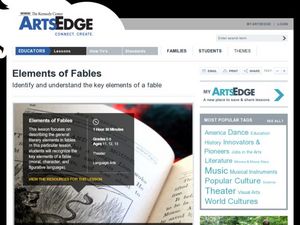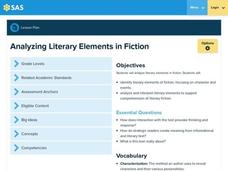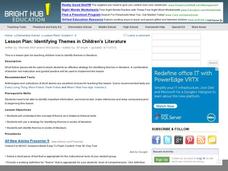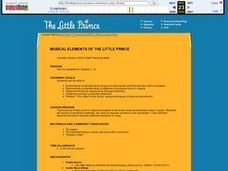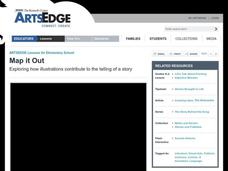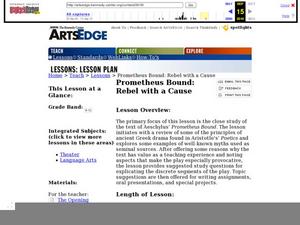College Board
2009 AP® English Literature and Composition Free-Response Questions
Scholars select a novel or play and craft an essay to discuss what the symbol reveals about the characters or theme. Writers also analyze a passage and a poem to determine how the authors use literary elements to relay their messages.
Curated OER
Elements of Fables
Students explore the attributes of fables. In this literature lesson, students read several fables and identify the moral lesson, characterization, and figurative language in each. Students then retell their favorite fables in their own...
Curated OER
It's in the Elements - Lesson Four
Students compare and contrast story elements in two versions of Cinderella. In this literature elements lesson, students are read two different versions of Cinderella, they identify the characters, plot, and setting, then they compare...
Pennsylvania Department of Education
Analyzing Literary Elements in Fiction
Students analyze the characters and events in fictional writing. In this literary elements instructional activity, students study the meaning of the words characterization and fiction. They listen to the story Pigsty by Mark Teague, or...
Curated OER
English Literature: An Overview
Relate literary works and authors to the major themes of English literature from the Anglo-Saxon period through the 20th century. Working in groups, high schoolers will evaluate period philosophy, religion, and politics that influenced...
Curated OER
Introduction to the Romantic Age of English Literature
Introduce your class to the elements of Romanticism with these slides. The foundations of the movement, the roles of imagination and nature, and the value of art are all highlighted. Features of Romanticism are explained such as...
Curated OER
Literary Element: Point of View
In this literacy worksheet, middle schoolers focus upon the element of literature know as the point of view. They use the story and discuss the first and third person context.
Curated OER
Examining Persuasive Literature
Examine persuasive literature and writing. In this persuasive literature lesson plan, pupils work through a variety of activities over the course of three weeks (each week is planned by day). The unit's purpose is to examine examples of...
Curated OER
Introducing Literary Elements in Fiction
Identify literary elements in fiction. In this reading comprehension lesson, learners read the book Pigsty and record literary elements onto a graphic organizer. They specifically discuss the main characters and events in the text.
Curated OER
Five Elements of a Story
Here’s a graphic organizer that permits learners to chart the introduction, rising action, climax, falling action and resolution of a story. The PDF file can be customized to work with any narrataive.
Curated OER
The Giver Literature Guide - Conflict
In The Giver literature guide worksheet, learners read several passages from the novel and identify the type of conflict it exemplifies and explain it.
Simon & Schuster
Les Miserables Classroom Activities
Modern readers apply classic themes to Victor Hugo's masterpiece, Les Miserables. After they discuss tricky vocabulary and plot elements from the novel, class members compare Hugo's written work to a stage or film adaptation of the musical.
Curated OER
Identifying Themes in Children's Literature
Identifying themes in literature is the focus of the language arts lesson plan presented here. Learners read short pieces of fiction and practice the skill of identifying the themes present in each one. The bulk of the lesson consists of...
Vanier College
Analyzing Short Stories/Novels
Good questions can help focus readers' attention on the elements writers use to add depth to their stories. The questions on this worksheet do just that and encourage readers to think critically about a story and author's purpose.
ReadWriteThink
Literature Circles: Getting Started
Make reading more enjoyable and interactive with literature circles! Here you'll find detailed lessons to begin the literature circle process. Ten lessons introduce each role learners take on. Literature circle roles include...
Curated OER
MUSICAL ELEMENTS OF THE LITTLE PRINCE
Young scholars demonstrate knowledge of musical instruments and the families of the orchestra. They acknowledge different voice types found in opera. Students interpret emotional expressions through listening. They compose sounds to...
Curated OER
Analyzing the Use of Irony in a Short Story
Ninth graders examine how literature connects to real-life and see how irony aids in the development of theme. They read Shirley Jackson's The Lottery, and discuss elements of foreshadowing and situational irony. Then learners will write...
Curated OER
Create a Playbill!
Seventh graders explore the various elements found in the advertisement of a dramatic experience. Playbills are created that reflect the plot without revealing the climax of the play. Costumes, set construction, and character description...
Curated OER
Map It Out
Explore how illustrations add to a story. Young learners will look at picture books to see how the pictures tell the story. They create illustrations to go with a chosen story, and then flip the activity so they have to write a story to...
Curated OER
Different Strokes For Different Folktales
Young readers use graphic organizers, such as Venn diagrams and story maps, to analyze a variety of folktales and the elements of a story. They use writing, sequencing activities, and creative art to identify the morals learned from a...
Curated OER
Poetry As Oral Performance
Reciting poetry is a great way to build oral language skills and build classroom community. Pupils look at the text elements of poetry and choose a poem to read aloud. They focus on rhythm, fluency, and expression. This is a great way to...
Curated OER
Prometheus Bound: Rebel with a Cause
If you are teaching Aeschylus' Prometheus Bound, you can't afford to miss this source. An extensive list of ideas outlines numerous discussion topics, writing prompts, comprehension questions, oral presentations, and projects. Have class...
Curated OER
Pride and Prejudice
Help your class recognize classic literature with universal themes. They will demonstrate their familiarity with Pride and Prejudice by updating a selected scene from it to the 21st century. Tip: Bring in a modern movie clip that shows...
Curated OER
Fifteen Seconds of Fame
A reading of Panic in Paris launches a review of the elements of narrative writing. Class members work in groups to find narrative devices in the book and record their findings on a provided worksheet. Using the completed pages, emergent...
Other popular searches
- Literature Elements
- Elements of Literature Theme
- Dramatic Literature Elements
- Literature Elements Themes
- Fantasy Literature Elements
- English Literature Elements



